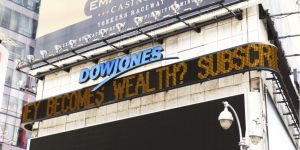Stocks gyrated between green and red territory Tuesday as investors remained pensive about the next step in trade negotiations, putting a lid on gains for riskier assets today.
It wasn’t a terrible Tuesday, but it certainly could have been better. When the closing bell sounded the Nasdaq Composite was lower by 0.34% while the S&P 500 closed down by 0.32%. The Dow Jones Industrial Average lost 0.47%. In late trading, just 11, or barely more than a third, of the Dow’s 30 components were in the green.
An interesting fact, courtesy of the ETF Research Center: the price-to-earnings ratio on the SPDR Dow Jones Industrial ETF (NYSEARCA:DIA), the Dow tracking ETF, currently resides in an area that was seen following the fourth-quarter 2018 and May 2019 declines, which eventually gave way to equity market rallies.
Healthcare Checkup
As I mentioned yesterday, Johnson & Johnson (NYSE:JNJ) was waiting on a ruling from an Oklahoma judge in the opioid case. That ruling was publicized late Monday and Dow components JNJ is on the hook for more than $572 million, a mere penance for an almost-$347 billion company that generates as much free cash as JNJ does. So shares of JNJ jumped 1.44% today, but one analyst indicated investors may not be paying attention to the fine print.
“J&J held a 1% market share of Oklahoma’s opioid market, far less than Purdue and Teva, which settled for $270m and $85m, respectively,” said Berenberg Capital Markets analyst Patrick Trucchio. “Thus, to us, the $572m judgment is very bearish; if it holds on appeal, it could put a bear case scenario of $150bn of litigation liabilities for all opioid players…in all tracks (i.e., states, federal MDL, DOJ…in play.”
UnitedHealth (NYSE:UNH) remains a dog among Dow healthcare stocks as highlighted by today’s slide of 3.57%. I’ve noted multiple times this year that UNH has been plagued by political concerns, meaning the Medicare For All debate, but the stock’s woes are mounting outside of the political arena.
“A July hospital survey from JPMorgan last week has heightened concerns about insurers’ spending on patients’ medical claims in the third quarter. Anthem Inc., UnitedHealth Group Inc. and Centene Corp. were among the companies that flagged rising costs in the past quarter,” according to Bloomberg.
And to make matters worse, the next round of Democratic debates is just a few weeks away, so at a time when UNH should be steady due to its defensive posture, the shares are under siege on multiple fronts.
Grounded For Today
Shares of Boeing (NYSE:BA) have recently been hot, but the stock lost 1.19% today, which was mostly the symptom of broader market declines, not a lawsuit out of Russia that, justifiably so, did not unnerve investors.
“Avia Capital Services, a subsidiary of state-owned Russian conglomerate Rostec, is suing Boeing to cancel 737 MAX orders,” reports Barron’s. “Avia isn’t listed specifically in Boeing’s commercial orders database, probably because it is classified as a lessor or an unidentified client. Boeing had no comment on the lawsuit.”
Russia is a minor market for Boeing, and the thing for Boeing investors to focus on over the near-term isn’t Russia, but the company’s progress on getting the 737 MAX airborne again before the end of 2019.
Apple Angles
Shares of Apple (NASDAQ:AAPL) declined 0.71% amid reports that Huawei Technologies took some smartphone market share from the iPhone maker in China due to “nationalistic buying” attributable to the U.S.-China trade war.
Still, many market participants remain bullish on Apple with some technical analysts saying if the stock moves through the $215 area, upside from there could be significant.
Bottom Line on Dow Jones
Underscoring the still defensive tone to the market this month, gold is getting more and more attention, though the yellow metal was mostly sluggish today.
“The surge in demand for gold comes as global market uncertainty has risen in response to the imposition of new U.S. sanctions on Iran as well as growing certainty of more Fed rate hikes this year,” according to FactSet. “Expectations of lower long-term interest rates and the resulting weaker dollar are both contributing to gold’s strength.”
Adding to the allure of defensive positions is growing concern that the German economy, the Eurozone’s largest, is nearing or in a recession. On a related note, the second reading of the U.S. second-quarter GDP number is due out Thursday.
Todd Shriber does not own any of the aforementioned securities.
